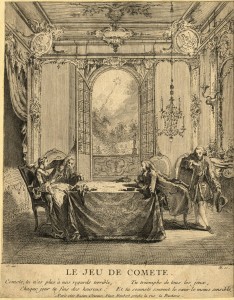I missed the transit of Venus earlier this morning.
I thought that special equipment was required but, apparently, all you need is a piece of paper -or so Jim Naughtie said in the Today programme. He was talking to Prof Jocelyn Bell-Burnell, who is giving a lecture about poetry and astronomy at the Hay festival tonight.
The combination of astronomy and poetry reminded me of the print below, filed by Douce with his images of table games:

After Charles-Nicolas Cochin, fils, Le Jeu de Comete, c. 1758-59, etching and engraving (Ashmolean Museum, Oxford)
I have not been able to find it in the Inventaire du Fonds Français, but it is recorded as after Charles-Nicolas Cochin fils (1715-1790) in at least two nineteenth-century catalogues. It shows a group of three men and a woman playing cards in an elegant drawing-room decorated in the rococo style. Through the window open to the garden, a comet can be seen crossing the sky.
The verses below the image explain how, presumably due to their improved knowledge of the natural world, these four people do not fear the comet any more. Unlike their superstitious forebears, they do not regard it as an omen. In fact, and judging from the print itself, they do not regard it at all -they seem more interested in their game of cards. More puzzingly, the couplet also refers to how the comet ’causes happiness every day’, ‘triumphs over any games’ and ‘often subjugates even the less sensitive heart’ (‘et tu soumets souvent le coeur le moins sensible’).
The comet’s triumphing over games could be read as a an allusion to the calculation of its orbit -a ‘triumph’ over hazard or chance. From the publisher’s address inscribed at the bottom of the print, it must have been produced in the 1750s -and, in 1758-59, the comet last seen in 1680 returned as predicted by Edmond Halley. As Ruth Wallis explains (Annals of Science, 1984, vol. 41, p. 279) ‘Never before had the appearance of a comet been predicted’ and the public interest was such that, by November 1758 the expected return of the comet had ‘become the subject of every day’s conversation’ (see, for instance, The Edinburgh Magazine for that month).
When Comet Halley finally appeared, its return represented the triumph of calculation over randomness. Or, as an anonymous contributor to The Gentleman’s Magazine controversially stated a few months before the sighting, ‘it is as absurd to believe the world to be ruled by chance, as to believe it was first made by chance’. His piece was entitled ‘Comets not dangerous’.
